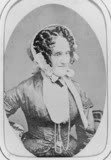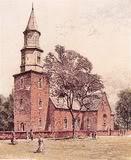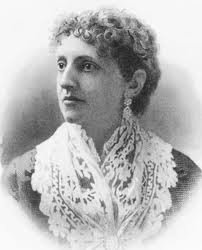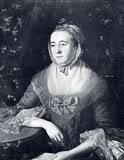Civil War Diaries from North Carolina
 Catherine Devereux Edmondston (1823-1875) was a member of the planter aristocracy of Halifax County, North Carolina. She was an educated woman of strong character whose intelligence and prejudices surfaced repeatedly in her letters and Civil War diaries. During the 1850s Catherine and her husband Patrick enjoyed a calm, fairly prosperous life at Looking Glass plantation. By 1860 they owned 88 slaves and a 1,894-acre estate, and were ardent secessionists.
Catherine Devereux Edmondston (1823-1875) was a member of the planter aristocracy of Halifax County, North Carolina. She was an educated woman of strong character whose intelligence and prejudices surfaced repeatedly in her letters and Civil War diaries. During the 1850s Catherine and her husband Patrick enjoyed a calm, fairly prosperous life at Looking Glass plantation. By 1860 they owned 88 slaves and a 1,894-acre estate, and were ardent secessionists.
Catherine Ann Devereux was born in 1823, one of six children to Thomas Pollock Devereux and Catherine Ann Bayard Johnson. She was raised in a wealthy plantation owning family where she received a private education from her father. In 1846 she married Patrick Muir Edmondston, a South Carolinian, and they eventually settled on Looking Glass Plantation in Halifax County, North Carolina, and were living there when the Civil War began in 1861.
They also operated a smaller plantation, Hascosea, nearby. The Edmondstons owned eighty-eight slaves. Their total estate comprised 1894 acres and had a value of $19,600. Both Catherine and Patrick were staunch secessionists. Catherine began keeping a diary in 1860, in which she recorded the events of her life as a plantation mistress. Its pages are filled with praise for the Southern cause and Southerners in general, and scathing references to the ‘Yankees,’ whom she deplored.
The March 4, 1861, entry clearly expressed her opinion of the new Republican president:
Today was inaugurated that wretch Abraham Lincoln President of the U.S. We are told not to speak evil of Dignities, but it is hard to realize he is a Dignity. Ah! would that Jefferson Davis was our President. He is a man to whom a gentleman could look at without mortification as cheif of his nation.
Early on, some of Catherine’s closest relatives supported the Union, and some of her diary entries expressed the feelings she harbored toward them.
On November 25, 1860, she wrote:
Mr. Miller [her brother-in-law] seems to have an especial spite against Slaveholders; asks in a tone of acrimony and bitterness if ‘we expect the West and the white population who have none, to fight for our Negroes?’ ‘Certainly I do.’
February 10, 1861:
Sister Frances is a terrible Unionist! Right or wrong, this ‘Glorious Union’ is everything. Now it is no longer glorious—when it ceases to be voluntary, it degenerates into a hideous oppression. Regret it heartily, mourn over it as for a lost friend, but do not seek to enforce it; it is like galvanizing a dead body.
February 18, 1861:
It gets almost painful to go to Father’s we differ so widely. He, it is true, says nothing personal or unhandsome, but he censures so sweepingly every thing that SC [South Carolina] does. Mama and Susan do go on so about the ‘Flag.’ Who cares for the old striped rag now that the principle it represented is gone? It is but an emblem of a past glory. How can it be upheld when the spirit—nay even the body—that gave it value is lost?
In 1863, one of the most frightening aspects of the Civil War for slaveholders came to eastern North Carolina: the recruitment and arming of former slaves by the Union Army. The wealthy planters strongly feared what might befall them if their former slaves were given weapons.
In May 1863, Catherine described what she called “the Federal theft of slaves from the homes of friends in the area, for the purpose of recruiting them.” She believed this was a deplorable crime, but the murders and atrocities reportedly committed against their former masters troubled her more. By the first week of June 1863, seven companies of former slaves had been recruited and were in camp near the Edmondston plantation.
And by 1863, most North Carolinians were feeling the effects of the Union blockade of all Southern ports. Goods such as leather shoes, coffee, salt and factory-made cloth were no longer available. Catherine noted on January 23 1863, that she felt ‘truly blessed’ because shortages had affected life at Looking Glass plantation very little, except for having to add blackberry leaves to the stock of tea and “the cessation of all desserts but baked Apples.”
But by the end of 1863, her situation had worsened, although the self-sufficiency of the plantation alleviated conditions somewhat. On December 3, 1863, Catherine wrote:
Very busy dying warp for Mr E’s and my own clothes. So we have come to it and are to wear our own homespun! In fact I find that most articles of prime necessity except salt, iron and paper can be produced at home by us. This ink, for instance, is of my own manufacture, and I do not see why it is not as good as the ‘boughten’ article.
But only ten days later, she mentioned the rapidly deteriorating economic conditions in her diary. One of her acquaintances had paid $750 for a barrel of sugar in Virginia, and her own husband had spent $60 to buy her a pair of French boots, adding, “I consoled myself for the seeming extravagance by resolving to send 12 or 14 lbs of butter to Petersburg, where it is from 4 to 5 (dollars) per lb.”
In an entry from December 25, 1864:
Came Mr. E home yesterday from Clarksville, bringing with him a Proclamation of Governor Vance calling on every man who can handle a musket or stand behind a breast work to rally at Wilmington for its defense. A levy en masse of the whole state is ordered, so this morning we packed a few things in a satchel for him, and taking his blanket as the Governor ordered, he is off to report to General Leventhorpe for duty.
A sad Christmas! In place of Santa Claus bringing me anything, he takes my husband from me for an indefinite time. When will we see a merry one? ‘Merry Christmas,’ it seems a mockery thus to salute one in this war-torn country. How can we be merry with one’s best and dearest gone, exposed to Yankee bullets, to danger and to sudden death!
Fortunately, Patrick survived the war, and Catherine’s former slaves did not attack her while she slept, but she never reconciled her devotion to the Confederacy with the humiliation of defeat and Reconstruction.
On July 28 1865, she vented her frustrations in her diary:
Since Monday a new element of bitterness has been infused into our daily lives. On that day, Father and Mr. Edmondston were forced, in order to protect themselves against Yankee and Negro insolence & to preserve the remnant of our property, to go to Halifax and to take the hated oath of Allegiance to that loathed Yankee Government!
The war greatly decreased the Edmondstons’ financial and social status. Patrick died suddenly in 1871, and his death devastated Catherine. She wrote to her nephew on September 10, 1871:
I am so weak in mind – almost as powerless as a little child! I am utterly incapable of any extended process of thought for every power and energy of my intellectual being seems numbed.
In 1872, Catherine anonymously published a pamphlet entitled The Morte D’Arthur: Its Influence on the Spirit and Manners of the Nineteenth Century. Her writing was filled with bitterness against the ‘barbaric’ North and praise for the ‘chivalry and good manners’ of the men who had served in the Confederate army.
After her husband’s death Catherine managed Looking Glass and Hascosea while seeking to “prevent the crust of age & isolation thickening around & over me until I become self absorbed—self contained—hateful to myself & to all with whom I come in contact.” At the Looking Glass sale in December 1874, less than a month before her own death, she returned the highest bid on the land. The bid was accepted and she won the fight to retain what she had always considered to be her property.
Catherine Devereux Edmondston died at age fifty-one on January 3, 1875, in Raleigh, North Carolina.
Her diary, Journal of a Secesh Lady: The Diary of Catherine Ann Devereux Edmondston 1860-1866, was published in 1979.
SOURCES
NCpedia: Catherine Ann Devereux Edmondston
North Carolina and the Civil War: Catherine Ann Devereux Edmondston





